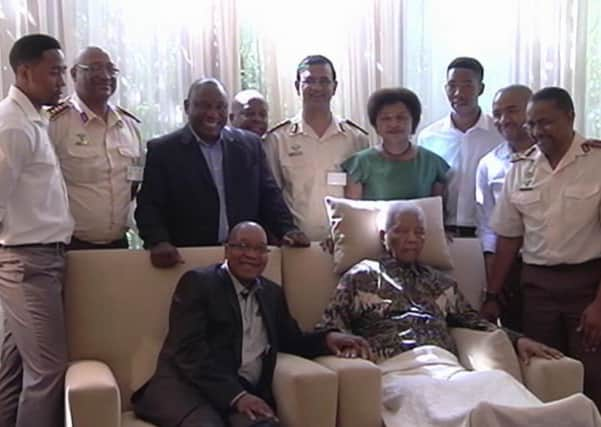Dying Mandela under surveillance, memoir claims


Such was the influence of South Africa’s liberation hero that he and his entourage became the target of espionage as relatives and corrupt officials sought to control his medical care for their own interests, according to the book by Zelda la Grange.
It is not clear why Mandela might be spied on, though the reported split between members of his now-wealthy family raged at the time.
Advertisement
Hide AdAdvertisement
Hide AdThe memoirs also scrutinises the behaviour of family members toward each other, to the point where doctors had to “consider the internal family politics above the interest of the patient”.
La Grange worked for Mandela for 19 years, becoming one of his closest confidantes and travel companions after he was elected the country’s first post-apartheid president in 1994. She was pushed out of his inner circle in the months before he died last December.
Good Morning, Mr Mandela reveals disturbing details of the battles to control his medical team, access to his hospital room, revenue from his trust funds, and even his funeral.
The Globe and Mail newspaper reported that two unknown people mysteriously joined Mandela’s medical team in 2012 as he became increasingly frail.
His doctors were unable to identify them, la Grange writes. Mandela’s wife Graca Machel and his household staff believed the pair were state intelligence agents, she states.
La Grange says she wrote to the president, Jacob Zuma, to complain suspected intelligence agents were infringing on Mandela’s “privacy and dignity” as his health worsened.
They eventually disappeared from the medical team, only to reappear a few weeks later.
“Influences were at play that allowed people to abuse state resources for their own benefit. This was a clear example of a corrupt government that allows this kind of interference,” she says in her book.
Advertisement
Hide AdAdvertisement
Hide AdLa Grange says she suspected that her phones and those of Mandela’s wife and others were being secretly tapped.
She does not identify exactly who would have spied on Mandela and his wife and staff.
But other sections of her memoir accuse Mandela’s eldest daughter, Makaziwe, and factions loyal to Zuma in the ruling African National Congress, of seeking to control Mandela in his final years.
The memoirs also relates the alleged behaviour of family members at the time.
La Grange writes that Mandela’s wife Graca was “emotionally brutalised” by Makaziwe, including one episode where she mocked Graca’s frantic reaction when Mandela was stranded on the way to hospital when an ambulance broke down.
His wife was also frozen out of key medical decisions and even had to apply for accreditation to attend his memorial service because of the hostility of family members led by his daughter, the memoir claims.
La Grange writes scathingly of the “poison” in the Mandela family and how some factions used Mandela’s mute frailty in hospital as an opportunity to “step in and start controlling matters to their advantage”.
As early as 2010, the former president’s health was suffering because of interference by some family members who took control of the medical decisions, la Grange claims.
Advertisement
Hide AdAdvertisement
Hide AdDoctors were forced to “consider the internal family politics above the interest of the patient,” she says.
One specialist, brought in to examine Mandela in early 2011, expressed “shock” at his medical care, the book says. Some of the former president’s doctors and nurses “seemed uninterested in his condition and discomfort”.
The book also claims Zuma’s political loyalists controlled access to Mandela and treated him like a “caged animal” when they wanted a photo with him for political purposes just months before his death.
Makaziwe Mandela, speaking to a South African newspaper, would not comment on the book’s allegations but warned that la Grange could be sued if she cannot substantiate her comments.